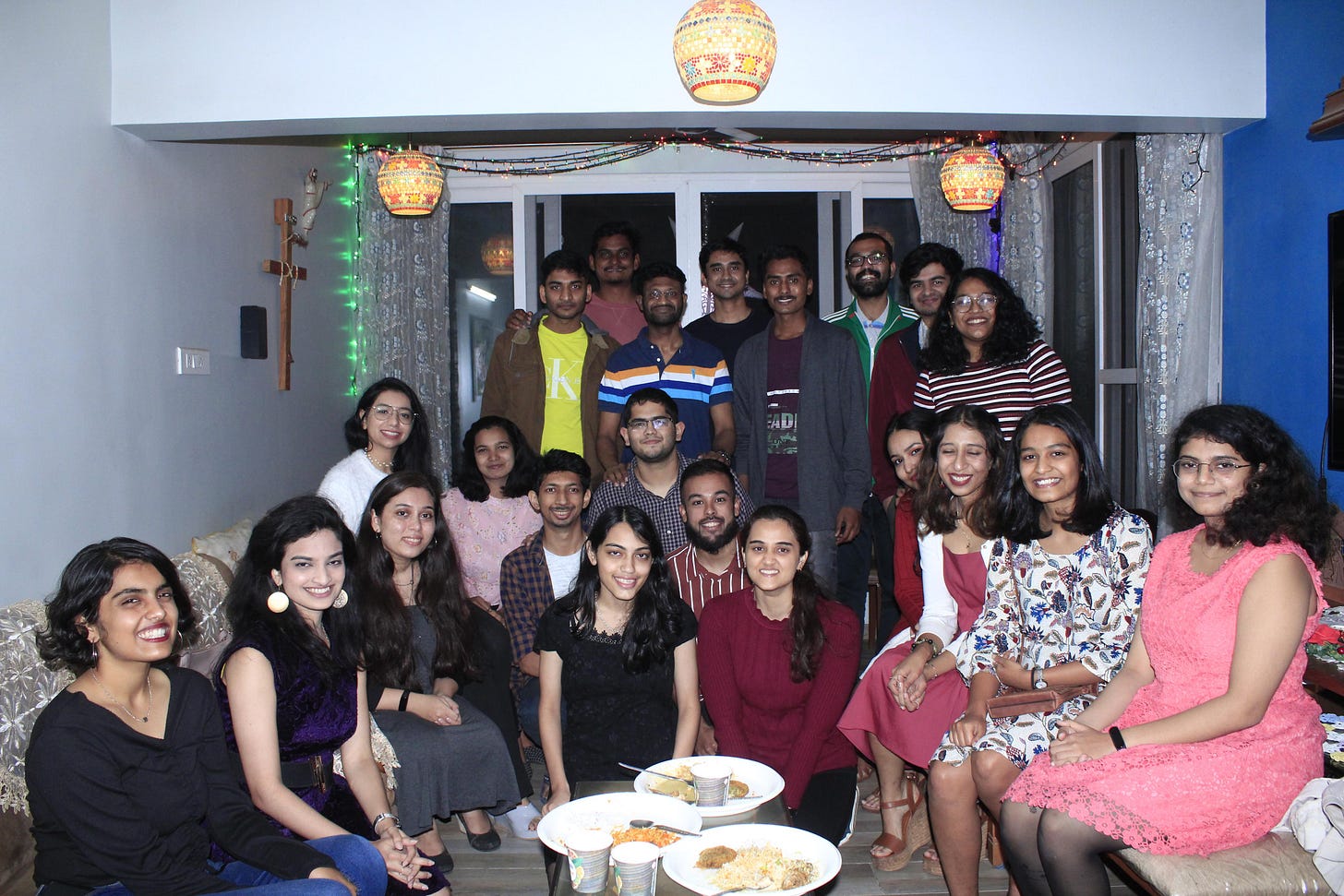Three years ago, I recruited a handful of friends for a book club around Christmastime. We got together with copies of Timothy Keller’s ‘Hidden Christmas’ and talked about, well, Christmas.
This book club was one of the very first evangelistic activities I finagled together as a Catholic only just beginning to reconnect with my faith.
Knowing what I know now about Tim Keller’s dodgy theology, I probably wouldn’t organise that particular book club again. But what I did love about his book still stands—it presents the Christmas message in a straightforward and memorable way that I can quote even years later. And it can be very persuasive.
My favourite thing he says in the book comes right at the start, when he brings to your notice that Christmas is the one time of the year when the people around you—regardless of their religious beliefs—are subconsciously thinking about Jesus Christ.
This is, as the meme goes, free real estate.
Tim Keller writes:
“Once a year at Christmas these basic truths become a bit more accessible to an enormous audience. At countless gatherings, concerts, parties, and other events, even when most participants are nonreligious, the essentials of the faith can sometimes become visible.”
He gives the example of the popular Christmas carol “Hark! The Herald Angels Sing.” The carol, Tim points out, answers all the basic questions about the Christian faith: Who is Jesus? (He is the “everlasting Lord” who comes down from “highest heaven” to be the “offspring of the virgin’s womb”.) What did he come to do? (He came to see “God and sinners reconciled.”) How did he accomplish it? (He “lays his glory by” that we “no more may die.”)
It’s not uncommon, even in India, to hear this carol or, at the very least, its tune playing in malls and on loudspeakers at street corners. At the book club, we talked about how awesome it is to have this ready-made opportunity to talk about Jesus to our friends. We reflected on the fact that we rarely, if ever, grab this opportunity with both hands.
And then we had an idea:
What if we threw a Christmas party?
Technically, it was an Advent party
My friend and book club member, S, decided she’d host the party in her house. She also took it upon herself to invite every non-Catholic friend she had—and she had many. Since it was already the middle of December, we knew we needed to act fast if we really wanted to capitalise on the Christmas spirit. So we cobbled together the idea for the party on Thursday, the day of the book club meeting, and had the party on Sunday.
Reader, more than twenty people showed up!
We planned to have sweets and homemade ginger wine, but the main goal of the evening was to tell our friends about the real meaning of Christmas. So we did three things:
We played a fun Christmas-themed quiz (with prizes!) on the different, maybe lesser-known aspects of the Christmas story
Since it was Gaudete Sunday, we went in a circle and shared one thing in our lives that brought us joy recently
And lastly, we stood and said a short prayer thanking Jesus for being the source of our joy in the Christmas season
And then we had dinner, danced a little bit, and chatted the night away.
A radical faith creates ripples
India is, technically, a Hindu nation. But I’ve been suspecting for years now that most of my Hindu friends are, for all intents and purposes, functioning atheists.
Let me give you an example. I was once sharing the Gospel with a Hindu friend who asked me to tell her what the Bible teaches. It was a rare opportunity to explicitly talk about Jesus and His message with someone of another faith, so I launched into a brief overview of the Bible story, with Jesus as its star.
Once I was done, she asked me a question that stopped me in my tracks: “So… How much of this do Christians believe to be true?”
I stuttered. “All of it!”
“Even the Jesus stuff, that he rose from the dead, all of that?”
“Yeah! It’s not just belief. Jesus was a real man who walked this year two thousand years ago. No historian worth his salt would disagree with that.”
“Wow,” she said. “I had no idea that any of this is supposed to be real.”
It makes sense, because the Hindu religion presents stories of “gods” that are a bit too fantastical for the mind to grasp. And it’s not just the god stories that have an ethereal quality to them; the rituals, the practices, even some of the core beliefs—such as the caste system—are rooted in an understanding of the world that many Hindus themselves believe to be fundamentally wrong.1
Why do they go along with these rituals and beliefs, then? It’s a combination of apathy and not wanting to rock the boat. Many Hindus (and even some Christians) do not see any harm in participating in rituals that they do not personally believe in “as long as it’s not hurting anyone.”
The point here is not to question the legitimacy of these rituals (although, as a Catholic, I do not doubt that these rituals do not glorify the one true God), but to explain why the concept of true faith is quickly becoming alien in this country.
In a time where many people are beginning to view their religion not as a set of beliefs that they personally subscribe to but as a mere cultural identity thrust upon them, a Christian who truly believes in her faith can be a radical thing.
To posit that Jesus Christ really did walk this earth two thousand years ago.
To suggest that historical evidence as well as the behaviour of the apostles tells us that Jesus really did rise from the dead.
To profess that having a personal relationship with Jesus Christ is possible, even today, through the sacraments of the Church as well as personal experiences of His love.
Each of these, genuinely proclaimed, can stop our neighbours in their tracks and invite them to marvel at a person whose religion is not just a consequence of their birth but a reflection of the beliefs embedded in their hearts.
If we believe that it’s real, we must act like it’s real
Last year, I invited two non-Catholic friends to attend Christmas midnight mass with me. After the mass, we came back to my place for wine, sweets and presents.
Later, I spoke to one of my friends about what she thought about the Mass, and she said, “You know, Krysanne, I don’t really believe in any of this stuff. But I appreciate that you keep inviting me to come and see what your faith is all about. If you didn’t, I’d think that you were just pretending to be Christian.”
If a majority of our non-Catholic friends are functionally atheist, they’ve got their eyes on us, trying to suss if we’re just the same as them.
And here’s the thing:
Simply going to Mass, as important as it is, isn’t going to cut it. Because I have several friends who go to the temple every Diwali but don’t really believe in God.
Our faith needs to stem from something deep within us, a personal conviction that Jesus is the way, the truth, and the life, and nobody can go to the Father except through Him.
And, stemming from this deep personal conviction, it must manifest in how we live our lives. We must be joyful, yes, and loving, and kind, and generous. But we must also invite our friends to share in this joy, to come and see Jesus. We must always be on the lookout for opportunities to share the Gospel message with our neighbors. These are the marks of a true faith, a radical faith, an authentic faith.
How can you create ripples this Christmas?
The point is not to throw an elaborate party but to use the Christmas season as a springboard for sparking meaningful conversations about Jesus.
Here are some ideas.
Invite some friends to go caroling with you, especially to the non-Christian households in your neighbourhood. Bring along a small card for each family that gives the meaning of Christmas.
Be present at your local Church on Christmas day to greet any non-Christian visitors who might drop by. Show them around the Church and answer any questions they might have. Invite them to attend Mass with you the following Sunday.
Throw an Advent party—why not! Organise a Christmas-themed quiz, tell your friends what Advent is all about, and even lead them in a short prayer if you’re comfortable.
Everyone likes a cozy movie night. Invite some friends over to watch an episode of The Chosen with you (it’s on Netflix!) Use that to spark conversations with them about what they know about Jesus.
Invite friends to go to midnight Mass with you. Be prepared to explain the different parts of the Mass to them. Don’t forget to show them the crib!
As always, this is not a comprehensive list. What would you add?
While writing this newsletter, I was reminded of another one I wrote three years ago, reflecting on how Christmas no longer felt like Christmas after my Dad passed away. If you’re in a similar boat, mourning those “Christmas feels” that seem missing this year, you might want to give it a read:
Thank you for reading park dates with krys! I’m really glad that you’re here. If you enjoyed this newsletter, would you consider giving it a share?
Your friend,
Krys
I recently watched a video of Cliffe Knechtle debating a Hindu student on the UT campus. The student in this video is a prime example of a self-identified Hindu who does not believe in the caste system—a core tenet of the Hindu belief system.








